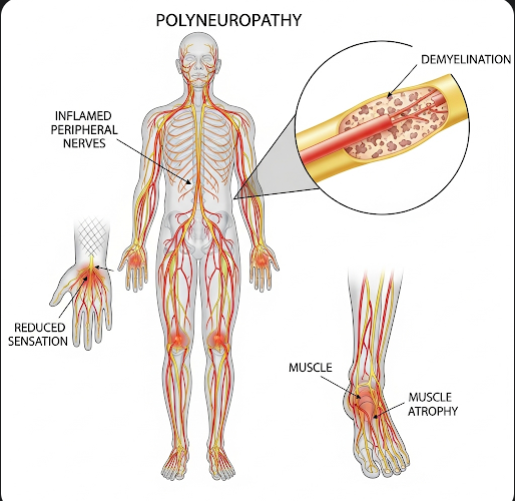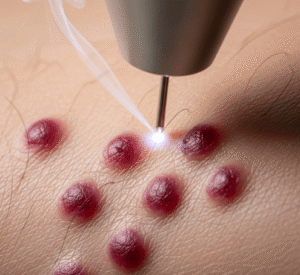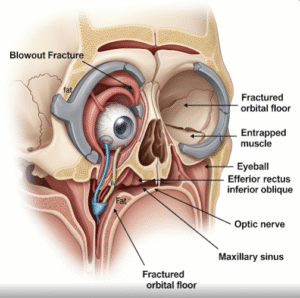Overview
Polyneuropathy is a condition involving damage or dysfunction of multiple peripheral nerves, often affecting the same areas on both sides of the body. It most commonly affects the hands, feet, legs, and arms, and is associated with symptoms such as numbness, tingling, weakness, and burning pain. It is usually symmetrical and progressive, and can be caused by various underlying diseases, toxins, or nutritional deficiencies. Polyneuropathy can be acute or chronic, and proper diagnosis is essential for targeted treatment.
What is Polyneuropathy?
Polyneuropathy refers to a widespread disturbance of the peripheral nervous system, which includes sensory, motor, and autonomic nerves. Unlike mononeuropathy (affecting a single nerve), polyneuropathy typically presents as a “stocking and glove” pattern—starting at the toes and fingers and gradually moving upward.
There are different types of polyneuropathy based on cause and function:
- Sensory polyneuropathy – affects sensation
- Motor polyneuropathy – affects muscle strength and control
- Autonomic polyneuropathy – affects involuntary functions (e.g., heart rate, digestion)
- Mixed polyneuropathy – affects multiple types of nerves simultaneously
Symptoms
Symptoms vary depending on the type and severity of nerve involvement but generally include:
- Tingling or “pins and needles” in the hands or feet
- Burning, stabbing, or shooting pain
- Numbness or decreased sensation
- Muscle weakness or cramps
- Difficulty walking or loss of coordination
- Sensitivity to touch
- Foot drop or hand clumsiness
- Low blood pressure, dizziness (if autonomic nerves are affected)
- Digestive or urinary issues (in autonomic neuropathy)
Symptoms often start in the feet and may gradually spread to the legs and hands.
Causes
Polyneuropathy can result from numerous causes, often grouped into metabolic, toxic, infectious, autoimmune, hereditary, and idiopathic categories.
Common causes include:
- Diabetes mellitus – most common cause worldwide
- Chronic alcohol abuse
- Vitamin deficiencies (especially B1, B6, and B12)
- Kidney or liver disease
- Hypothyroidism
- Autoimmune diseases (e.g., lupus, rheumatoid arthritis)
- Infections (HIV, Lyme disease, hepatitis C)
- Toxins (lead, arsenic, chemotherapy)
- Certain medications (e.g., isoniazid, metronidazole, chemotherapy drugs)
- Genetic disorders (e.g., Charcot-Marie-Tooth disease)
- Paraneoplastic syndromes associated with cancer
In some cases, the cause is idiopathic, meaning unknown even after testing.
Risk Factors
Factors that increase the risk of developing polyneuropathy include:
- Diabetes or prediabetes
- Prolonged alcohol consumption
- Poor nutrition or malabsorption syndromes
- Autoimmune or inflammatory diseases
- Exposure to toxins or certain medications
- Family history of hereditary neuropathies
- Cancer or history of chemotherapy
- Advanced age
Complications
If untreated or progressive, polyneuropathy may lead to serious complications:
- Chronic pain and discomfort
- Muscle wasting and weakness
- Permanent nerve damage
- Loss of coordination and increased fall risk
- Skin injuries, infections, or ulcers due to numbness
- Autonomic dysfunction (e.g., heart rhythm issues, digestive disorders)
- Depression or anxiety from chronic symptoms
Proper diagnosis and management are crucial to minimize long-term impact.
Prevention
Although not all causes can be prevented, the risk of polyneuropathy can be reduced with healthy lifestyle practices:
- Maintain good blood sugar control (for diabetic patients)
- Avoid excessive alcohol
- Eat a balanced, vitamin-rich diet
- Monitor and treat underlying conditions like kidney or thyroid disease
- Avoid exposure to known toxins and neurotoxic medications
- Use protective gear in workplaces with chemical exposure
- Get regular screenings if you have a chronic condition or family history of neuropathy
Early detection allows for more effective treatment and better outcomes.
Treatment Options in Korea
South Korea offers high-quality neurology and rehabilitation services for managing polyneuropathy, with personalized care at major medical centers.
1. Diagnosis
- Neurological examination to assess sensory, motor, and reflex function
- Nerve conduction studies (NCS) and electromyography (EMG)
- Blood tests for glucose, vitamins, thyroid, liver/kidney function
- Urinalysis and toxicology screening
- Nerve biopsy or skin biopsy in rare or complex cases
- Genetic testing for hereditary forms
2. Medical Treatment
- Pain management:
- Gabapentin or pregabalin
- Duloxetine or amitriptyline
- Capsaicin cream or lidocaine patches
- Treatment of the underlying cause:
- Insulin or oral diabetes medications
- Vitamin B12 injections or supplements
- Withdrawal from alcohol or toxic agents
- Immunotherapy (for autoimmune causes): steroids, IVIG, or plasmapheresis
3. Rehabilitation and Support
- Physical therapy to improve strength, balance, and mobility
- Occupational therapy to maintain independence
- Orthotic devices (e.g., braces for foot drop)
- Education and counseling on self-care and foot protection
4. Advanced Care and Monitoring
- Autonomic function testing
- Fall risk assessments
- Multidisciplinary care including pain specialists, endocrinologists, and nutritionists
5. Best Hospitals in Korea for Neurological Care
- Seoul National University Hospital
- Samsung Medical Center
- Asan Medical Center
- Severance Hospital (Yonsei University Health System)
These centers provide:
- State-of-the-art diagnostic tools
- Experienced neurology and rehabilitation teams
- English-speaking international care units
- Long-term management plans for chronic neuropathies













